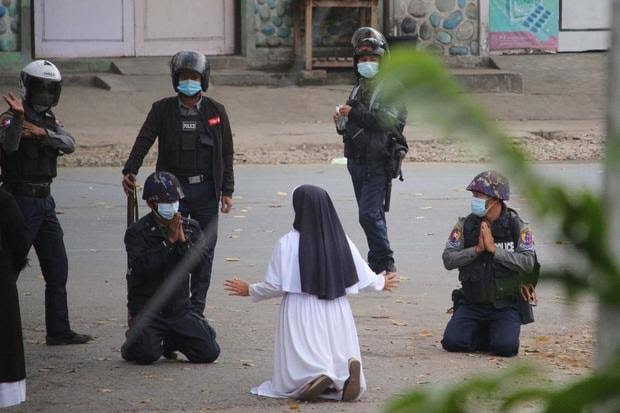
Lk.4:21-30
This image shook the conscience of the entire world, which was captured by the civilian protest against military rule in Myanmar. It was Sr. Ann Rose Nu Tawng. She had a terrible fear of the army from her childhood onwards. She ran away from her home at the age of nine because of her fear of soldiers. Her mind was filled with memories of the army chasing her with their weapons. Therefore, she used to hide whenever she met army personnel. She was working in a centre meant for the rehabilitation of homeless people. During their struggle for democracy last March, around a thousand four hundred people were massacred by the army, and they arrested around 10,000 people. That day, Sr. Ann was strengthened by the Lord and realised that it was her mission to plead for the lives of children there. So she knelt before soldiers and said: “Don’t shoot and torture the children, but shoot me and kill me instead…” The world was moved by the prophetic witness of this Catholic nun who fearlessly threw her life at gunpoint and pleaded for others…
Our time demands the prophetic witness of the gospel message from the followers of Christ. Being a prophet throughout all the ages is challenging and demanding. If so, why do we need to get into the shoes of a prophet? This prophetic identity is inseparable from our Christian vocation. Even then, many of us are hesitant to live this dimension of our identity because we are afraid of rejection and don’t want to displease anyone. We tend to think that it is better to mellow down our prophetic identity and please our fellow brethren than God.
The Gospel passage of the day leads us to understand the way Jesus lived his prophetic identity. When people heard the prophecy of Isaiah from Jesus and his gracious words, everyone appreciated him. In any case, Jesus did not want to stay in those pleasant moments and make his natives happy. Immediately, Jesus points out the stubbornness of their hearts that they expressed throughout all the ages. Jesus reminded them about the experiences of their iconic prophets, namely Elisha and Elijah. Both of them reminded the Israelites and their rulers concerning their infidelity to Yahweh. They were convinced that both were men of God, yet they remained stubborn before the words of the Lord. During the time of the prophet Elia, God punished the people of Israel with severe famine. And God sent the prophet Elia to a poor widow in Zarephath. Similarly, at the time of Elisha, though there were many lepers in Israel, only Naaman the Syrian got healed. Because of their stubbornness, God’s grace has gone to other nations. Jesus used these examples to point out the same stubbornness of his own natives. When they heard this bitter truth from Jesus, they were deeply annoyed and tried to destroy him, just as their ancestors did to other prophets.
Being a prophet demands lots of hardships, misunderstandings, etc. Our consolation is the assurance that God gave to the prophet Jeremiah that we come across in the first reading. Being a prophet is not merely our choice. It is the Lord who knew us before we were formed in our mother’s womb, who sanctified us and appointed us as prophets to the nations. It is the Lord who strengthens the prophet. How can a fragile single man stand against the whole nation? The Lord himself is the source of strength for the prophet. The Lord says to the prophet Jeremiah: “They will fight against you; but they shall not prevail against you, for I am with you, says the Lord to deliver you.” (Jer. 1:19) We can be a prophet only when we are convinced of God’s mighty hand in our lives, which is mightier than any other mortal man. When we analyse the history of prophets from the time of Moses till today, their superhuman courage is not out of their own strength; they have ardent faith that they are not alone and God is with them. They are only his mouthpieces; prophecy and the mission belong to the Lord.
As we mediate on this gospel passage, let us seriously reflect on our vocation to be a prophet. What are our innermost thoughts concerning this? Whether we try to please God or human beings, Why do we fail to be the mouthpiece of God when we encounter injustice? Are we afraid of rejection or physical violence from those who are against us? The choice is ours. God will not compel us to live in this dimension of our vocation. However, we can’t be an authentic follower of Christ without being a prophet. Let us be assured that we are not alone in living out our prophetic witness. God is with us and it is his grace that helps us to live our prophetic witness in a fruitful manner.